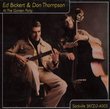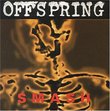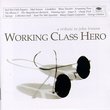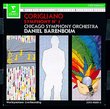| All Artists: Karni Title: Rozsa: Viola Concerto; Hungarian Serenade Members Wishing: 0 Total Copies: 0 Label: Naxos Original Release Date: 1/1/2008 Re-Release Date: 12/16/2008 Genre: Classical Styles: Forms & Genres, Concertos, Instruments, Strings, Symphonies Number of Discs: 1 SwapaCD Credits: 1 UPC: 747313092574 |
Search - Karni :: Rozsa: Viola Concerto; Hungarian Serenade
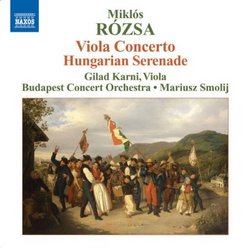 | Karni Rozsa: Viola Concerto; Hungarian Serenade Genre: Classical The spirit of his native Hungary is seldom far away from the concert music of Miklos Rozsa, in spite of some 55 years spent in Hollywood and his long associsation with music for the cinema. His Viola Concerto, the later o... more » |
Larger Image |
CD DetailsSynopsis
Album Description The spirit of his native Hungary is seldom far away from the concert music of Miklos Rozsa, in spite of some 55 years spent in Hollywood and his long associsation with music for the cinema. His Viola Concerto, the later of the two works presented here, was written in 1979 - at the request of Piatigorsky for the young Pinchas Zuckerman, who gave its first performance - and brings with it a certain astringency reminiscent of Bartok rather than Kodaly. Similar CDs
Similarly Requested CDs
|
CD ReviewsSome Impressive Concert Music by Miklós Rózsa J Scott Morrison | Middlebury VT, USA | 01/16/2009 (4 out of 5 stars) "The Viola Concerto (1979) was the last orchestral piece Miklós Rózsa wrote. His friend cellist Gregor Piatigorsky had enthusiastically mentioned the playing of the young Pinchas Zuckerman, best known as a violinist but becoming increasingly recognized as a superb violist. Piatigorsky died shortly afterward and Rózsa wrote this work for Zuckerman as a memorial to his long-time friend Piatigorsky. Zuckerman played the première of the concerto with the Pittsburgh Symphony under André Previn in May 1984. It has been recorded to acclaim by British violist Paul Silverthorne, but I have not heard that performance. Rozsa: Sinfonia Concertante, Op.29/Concerto for Viola, Op.37 Indeed, the present recording is my first encounter with the work. It is a long piece -- thirty-six minutes -- in, unusually for a concerto, four movements. The first movement begins in the lowest register of the solo viola and sets the tone for the concerto as a whole: dark, probing, anguished, nostalgic, both dramatic and lyrical. This movement is nearly twice as long as any of the other movements and has a cadenza that seems a cry in the dark. The second movement, although marked Allegro giocoso, seems more sardonic than jocose. There is a prominent part for wood block that somehow gives the whole a brittle nervous quality. The third movement, marked Adagio, starts out as if hidden in thick fog but somehow emerges into the sunlight and soars into the ether. The finale is a wild gallop with impressive (and impressively played) viola fireworks that are interrupted by pastoral, wind-dominated islands of repose before the movement gathers up momentum again and erupts into a wildly frenzied peroration. Violist Gilad Karni is an impressive soloist with a rich chocolaty sound, sound musical instincts and impressive virtuosity.
The 'Hungarian Serenade' (1932, rev.1945-1952) is 24-minute folk-tinged suite with five movements: Marcia, Serenata, Scherzo, Notturno, Danza. It was originally premièred in 1932 to lukewarm applause. But this became 'a thunderous ovation' when the audience noted that Richard Strauss, who was in the hall, was applauding vigorously. In its revised form it is almost a concerto for orchestra, with prominent solo parts for practically all the principal players of the orchestra, most notably the bassoon in I, violin, viola and cello in II, flute, oboe and bassoon in III. The Budapest Concert Orchestra under Mariusz Smolij are not entirely world-class, but they make a good case for the works. Recorded sound, although acceptable, is slightly glassy. Scott Morrison" |

